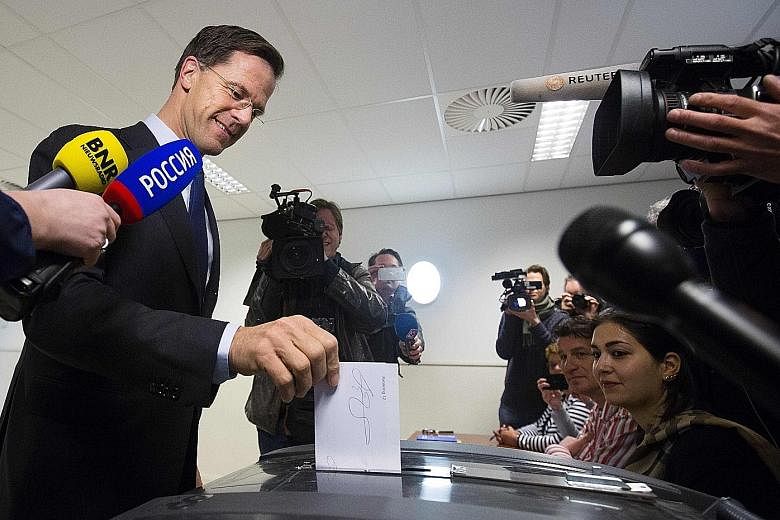AMSTERDAM • Dutch voters have rejected a treaty on closer ties between the European Union (EU) and Ukraine by a margin of nearly two to one, in a referendum that exposed the extent of anti-EU sentiment in one of the bloc's founding members.
British campaigners to leave the EU hailed the news from the Netherlands, as did the leader of France's far-right National Front, Ms Marine Le Pen.
About 61 per cent voted against the so-called association agreement on Wednesday. The turnout was about 32 per cent, clearing the 30 per cent threshold needed to declare the vote valid.
Dutch Prime Minister Mark Rutte, whose Cabinet had campaigned for approval of the pact, pledged to respect the result and said in a statement that a ratification of the treaty "cannot simply proceed".
His Cabinet will consider the result with its EU partners and Ukraine carefully, he said, adding that it will probably take weeks to do so. Technically, the referendum is not binding.
The ballot in one of the EU's six founding member states is another blow to the bloc as it grapples with a refugee crisis, security challenges and economic stagnation that has triggered a surge in support for populist parties, including the Dutch Freedom Party led by Mr Geert Wilders.
It comes just over two months before Britain votes in a referendum on whether to leave the EU - a so-called Brexit.
"Good morning the Netherlands, congratulations the Netherlands," Mr Wilders said in a Twitter post yesterday. Ms Le Pen congratulated him on Twitter, saying the result is another "step away" from the EU.
The broad political, trade and defence treaty is already provisionally in place but has to be ratified by all 28 EU member states for every part of it to have full legal force.
The Netherlands was the only country that had not done so.
The Dutch subjected it to a referendum as a result of a new law that allows citizens to challenge legislation, provided they gather a requisite number of signatures.
"(Many) are voting 'No' because they want to give a signal against the EU or Ukraine, or they just don't know what this association agreement is about," said political science professor Rebecca Adler-Nissen at Copenhagen University.
Part of the outcome "can be explained by anti-EU sentiment", while there is also a surge of the anti-establishment feeling being seen in politics in the United States and elsewhere, she added.
It was the second time Dutch voters have rejected the EU in a national referendum - the Netherlands also voted against the bloc's Constitution in 2005.
Ukrainian President Petro Poroshenko yesterday said his country would continue moving towards the EU despite the Dutch rejection.
Many Ukrainian politicians feel their country deserves the treaty and are keen to show they have made progress in aligning their country with EU standards since the 2014 uprising that toppled pro-Russian president Viktor Yanukovich.
Dutch leaders campaigning for the treaty had said voting against it would hand a symbolic victory to Russian President Vladimir Putin.
BLOOMBERG, REUTERS

